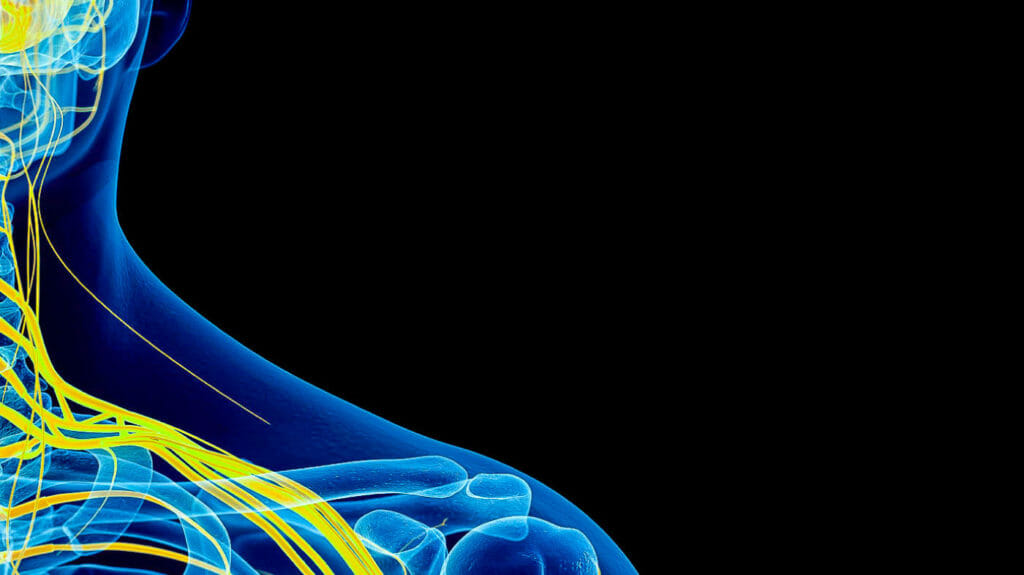
Are you currently experiencing neck pain? It’s a common problem with many causes. Neck pain affects neck, arm and shoulder movement, and it can be debilitating.
Let’s take a closer look at some of the causes of neck pain, as well as what you really need to know: how to relieve neck pain quickly.
Neck Anatomy and Neck Pain
The neck is part of your cervical spine, which is made up of seven vertebrae that allow flexion, extension, and lateral bending. This movable part of your spine supports your head and connects it to the lower, immovable part of the spine.
Neck pain can range from mild, with limited neck movements, to excruciating, with an inability to move the neck at all. Depending on the cause, neck pain can be temporary or constant, and it can radiate into other parts of the body, such as the shoulders and arms. Neck pain can start slowly over time, or it can come on immediately or a short while after an injury.
Neck pain can make it difficult to stand, sit, or move your upper body. Neck pain can cause stiffness and headaches, and make it difficult to use your facial muscles. Severe causes of neck pain can also cause weakness and numbness in your shoulders, arms, and hands.
Causes of Neck Pain

Before we dive into how to relieve neck pain, let’s take a moment to better understand what causes it.
Cervical Strain
Cervical strain generally involves pain and/or stiffness when you move your neck. The trapezius muscle on the side of your neck may be quite tender when it’s touched or palpated. This kind of neck pain is often related to an injury to the neck muscles.
Cervical strain may also result from the physical stresses of everyday life, including poor posture and sleeping habits.
Intervertebral Disc Degeneration
Intervertebral disks are gel-like cushions between the vertebrae, the bony segments of the spinal cord. These disks contain protective semi-fluid material. Degeneration or damage to the disks or vertebrae can lead to neck pain. Keeping the neck in one position for prolonged periods, such as when driving, reading, or working on the computer, can worsen symptoms.
Nerve Damage
Neck pain can also result from the compression of nerves that run along the neck. This kind of pain can radiate into the shoulders and cause weakness and numbness in the arms and hands.
How to Relieve Neck Pain
Now that we understand a bit more about the neck and what might cause symptoms there, let’s take a look at some ways to relieve neck pain.
Maintain Proper Posture
Keeping your neck in one position for long periods of time can let tension build up. We’re all guilty of sitting down to look at our phones for a minute and then realizing that 45 minutes have gone by. However, in this position, you’re flexing the neck and then holding it in that position.
The neck’s fragile structure does not like either hyperflexion or hyperextension. We need to find a balance in the range of motion and to remember to move around. If you decide to look down at your phone for a while, take a break after a few minutes to look up and around the room.
Try Yoga

A 2017 systemic review and meta-analysis found that yoga had short-term positive effects for individuals with chronic neck pain. These effects mainly related to yoga’s ability to promote range of motion and blood circulation. Yoga also helps relieve tension and pressure on the vertebrae and nerves by relaxing the surrounding muscles.
If you do not practice yoga, traditional neck stretches can produce the same relief. Even gently rolling your head from side to side can help relieve your neck pain.
Pain Medications
Depending on the nature of your neck pain, your doctor may prescribe muscle relaxants or anti-inflammatory medications.
I once had excruciating neck pain where my neck was also very stiff. Anti-inflammatory medications worked miracles and helped me recover. Consult a licensed health care professional to make sure you’re taking the right pain medication.
Avoid Moving Too Much
Severe neck pain can be aggravated by the movements of the muscles around your face, neck, shoulders, and hands. To relieve severe neck pain, try staying mostly still and focusing on self-care strategies, such as stabilizing the neck, applying pain creams, or using warm compresses to relax the muscles.
Give yourself time to heal before trying more active ways to relieve your neck pain.
Choose the Right Sleeping Position and Pillow

When clients ask me which pillow to buy, I always answer “the right one for you.” Take some time to go to the pillow store or read pillow reviews, especially reviews of the best pillows for neck pain.
If you’re a side sleeper, you need a pillow that can easily slide off your shoulder against the side of your neck.
If you sleep on your back, you’ll want to make sure your pillow is the right size. Bigger pillows might look fluffy and luxurious, but they’re likely to elevate your head so much that they deviate the curvature of your spine, which can cause tension in your cervical spine and lead to neck pain.
Neck Pain Red Flags
If you see any of these red flags with your neck pain, you should see your doctor as soon as possible.
Fever
Neck pain associated with a fever could mean you have an infection, such as osteomyelitis. Immunocompromised individuals and people with a history of using injected drugs are at increased risk of infection.
Instead of just treating it like regular neck pain, it’s safer to see your doctor quickly to rule out infection as a cause of your pain.
Anterior Neck Pain
Typically, neck pain is in the back of your neck, where the spine connects to the head. Neck pain in the front, or anterior, part of the neck could be related to non-spinal causes of neck pain, including angina pectoris, or visceral causes (esophageal obstruction, biliary disease, apical lung tumor).
To be safe, it’s best to see your doctor if your neck pain is in the front of your neck.
Neck Pain with Other Symptoms
Neck pain associated with a headache, shoulder or hip girdle pain, or visual symptoms (especially in an older person) may suggest a rheumatologic disease such as polymyalgia rheumatica or rheumatoid arteritis.
Neck pain that comes with unexplained weight loss in someone who has cancer could be associated with worsening cancer symptoms.
Either way, if you have pain in more than just your neck, it’s best to see your doctor instead of trying to relieve the neck pain yourself.